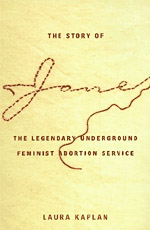 Talk about things they didn't teach you in school - comprehensive sex ed, how to write a cover letter, America's underground abortion networks.
Talk about things they didn't teach you in school - comprehensive sex ed, how to write a cover letter, America's underground abortion networks.I've been pro choice since I was a kid, and I understood as a teenager that illegal back alley abortions killed women. But I'm a little ashamed to say it wasn't until recently that I learned about pre-Roe feminist organizations that linked women with reputable abortion providers. This is all changed when I read Laura Kaplan's social history The Story of Jane.
Kaplan was one of the Chicago women who served in Jane from 1969 to 1973. She interviewed her former colleagues from Jane to weave a fascinating narrative of how a few feminists organized an underground railroad through which thousands of women safely obtained illegal abortions.
The story is incredible. A University of Chicago student named Heather Booth was active in civil rights and women's rights, and desperate women kept asking her where they could obtain abortions. She became known as a local resource for referrals, and recruited a group of women to help her field phone calls from women with unintended pregnancies. They contacted doctors and negotiated prices for the patients.
When Jane members realized one of their abortion providers was not licensed or professionally trained as a doctor, they saw it was possible to provide quality abortion care without a degree. One of the Jane leaders, referred to in the book as "Jenny," believed the organization could assist more women if Jane members became providers instead of relying as heavily on local doctors, many of whom charged high fees.
Jenny and several other women learned to perform first and second trimester abortions, though they had little or no medical background. Despite police surveillance and several serious setbacks, they operated for four years until the passage of Roe enabled women to legally seek out doctors for abortion services.
Kaplan's brisk prose is refreshingly readable, not academic. I finished the book in an afternoon and was never bored. My only regret is I don't know the identities of the women who were involved with Jane. They are true feminist role models, and were too humble to want or need recognition.
Jane and its sister organizations in other cities set out to meet the overwhelming demand for abortion services in the late sixties, and of course we still face numerous barriers to abortion access today. But there are lots of ways we can organize to expand access. Your pro-choice campus group can join FMF's Adopt-a-Clinic Campaign to support your local clinics.
We can educate ourselves and our decision makers by speaking out on how abortion works, sharing abortion stories, and discussing how prevalent and safe abortion is in the US. In the spirit of Jane, we can increase the number of abortion providers by pushing states to allow nurses and midwives to become providers, and working with med schools to include abortion care in the curriculum.
Jane exemplified civil disobedience at its best, where individuals took collective action to improve women's lives. It is an important part of our past that must stay in the past, and a reminder of why we fight for women's lives today and tomorrow. I hope to be as plucky and dedicated an activist as the women of Jane, and I am excited and privileged to know so many pro choice warriors who continue to embody that independent feminist spirit. We know we must never go back, and we won't.

No comments:
Post a Comment